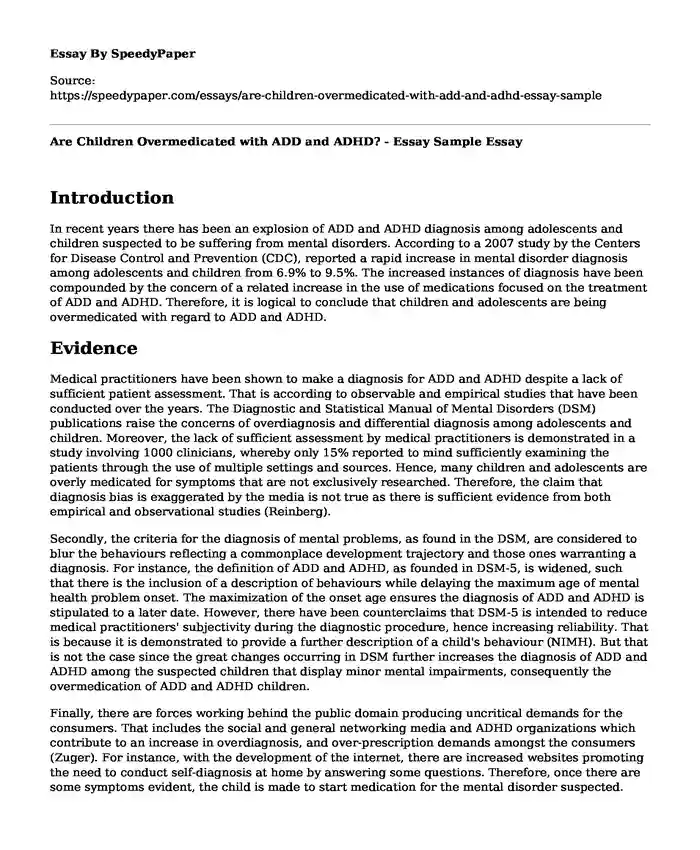
| Type of paper: | Essay |
| Categories: | Mental disorder |
| Pages: | 3 |
| Wordcount: | 657 words |
Introduction
In recent years there has been an explosion of ADD and ADHD diagnosis among adolescents and children suspected to be suffering from mental disorders. According to a 2007 study by the Centers for Disease Control and Prevention (CDC), reported a rapid increase in mental disorder diagnosis among adolescents and children from 6.9% to 9.5%. The increased instances of diagnosis have been compounded by the concern of a related increase in the use of medications focused on the treatment of ADD and ADHD. Therefore, it is logical to conclude that children and adolescents are being overmedicated with regard to ADD and ADHD.
Evidence
Medical practitioners have been shown to make a diagnosis for ADD and ADHD despite a lack of sufficient patient assessment. That is according to observable and empirical studies that have been conducted over the years. The Diagnostic and Statistical Manual of Mental Disorders (DSM) publications raise the concerns of overdiagnosis and differential diagnosis among adolescents and children. Moreover, the lack of sufficient assessment by medical practitioners is demonstrated in a study involving 1000 clinicians, whereby only 15% reported to mind sufficiently examining the patients through the use of multiple settings and sources. Hence, many children and adolescents are overly medicated for symptoms that are not exclusively researched. Therefore, the claim that diagnosis bias is exaggerated by the media is not true as there is sufficient evidence from both empirical and observational studies (Reinberg).
Secondly, the criteria for the diagnosis of mental problems, as found in the DSM, are considered to blur the behaviours reflecting a commonplace development trajectory and those ones warranting a diagnosis. For instance, the definition of ADD and ADHD, as founded in DSM-5, is widened, such that there is the inclusion of a description of behaviours while delaying the maximum age of mental health problem onset. The maximization of the onset age ensures the diagnosis of ADD and ADHD is stipulated to a later date. However, there have been counterclaims that DSM-5 is intended to reduce medical practitioners' subjectivity during the diagnostic procedure, hence increasing reliability. That is because it is demonstrated to provide a further description of a child's behaviour (NIMH). But that is not the case since the great changes occurring in DSM further increases the diagnosis of ADD and ADHD among the suspected children that display minor mental impairments, consequently the overmedication of ADD and ADHD children.
Finally, there are forces working behind the public domain producing uncritical demands for the consumers. That includes the social and general networking media and ADHD organizations which contribute to an increase in overdiagnosis, and over-prescription demands amongst the consumers (Zuger). For instance, with the development of the internet, there are increased websites promoting the need to conduct self-diagnosis at home by answering some questions. Therefore, once there are some symptoms evident, the child is made to start medication for the mental disorder suspected. Some claims tell the procedure is well regulated and accurate, but that is not the case. That is because mass media increase the promotion of self-diagnosis and the ADHD organization produce medications demanded by the consumers (Park). Thus, increased self-diagnosis leads to overmedication of the children.
Conclusion
Overmedication is evidenced by three points which include: diagnosis by medical practitioners despite sufficient assessment, biases by DSM, and production of uncritical customer demands. Despite the presence of counterclaims to overmedication, they are not sufficient enough to overwrite the claimed facts presented. Hence, children are increasingly being overmedicated for ADD and ADHD.
Works Cited
"NIMH >> Understanding The Brain Mechanisms Of Irritability In Youth". Nimh.Nih.Gov, 2018, https://www.nimh.nih.gov/news/science-news/2018/understanding-the-brain-mechanisms-of-irritability-in-youth.shtml.
Park, Madison. "Little People, Lots Of Pills: Experts Debate Medicating Kids". Edition.Cnn.Com, 2011, http://edition.cnn.com/2011/HEALTH/05/23/kids.overmedicated/.
Reinberg, Steven. "U.S. Kids Might Not Be Over-Medicated After All". Nytimes.Com, 2012, http://health.usnews.com/health-news/news/articles/2012/12/03/us-kids-might-not-be-over-medicated-after-all.
Zuger, Abigail. ""We'Ve Got Issues," By Judith Warner". Nytimes.Com, 2010, https://www.nytimes.com/2010/02/23/health/23book.html.
Cite this page
Are Children Overmedicated with ADD and ADHD? - Essay Sample. (2023, Mar 02). Retrieved from https://speedypaper.net/essays/are-children-overmedicated-with-add-and-adhd-essay-sample
Request Removal
If you are the original author of this essay and no longer wish to have it published on the SpeedyPaper website, please click below to request its removal:
- Free Essay Example on Unemployment as a Social Issue
- Free Essay on Advancement in Information Technology
- Essay Example on Mall Ethnography
- Free Essay: The Relationship Between Quality Management Practices and Innovation
- Free Paper Sample: Strengths and Limitations of the Evaluation Plan
- Free Essay - Ethical Issues Associated With Chemical Engineering
- Free Essay Example: Personnel Budgeting, Planning and Productivity
Popular categories




